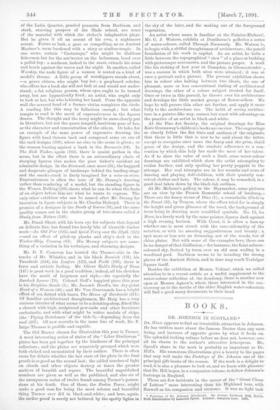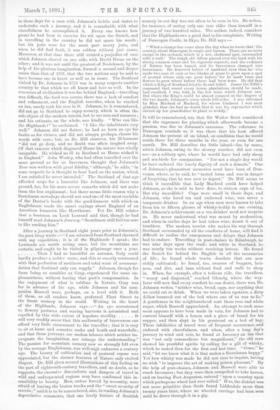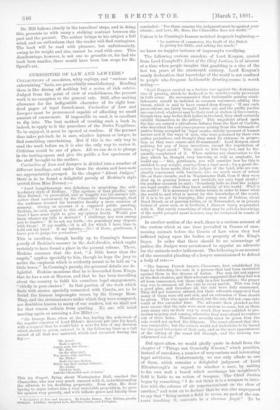BOOKS.
DR. JOHNSON IN SCOTLAND.*
DR. HILL appears to find an irresistible attraction in Johnson.. He has written more about the famous Doctor than any man- living, and increase of appetite grows by what it feeds on. The splendid-looking volume before us does not, however, owe all its charm to the author's attractive letterpress. Mr. Speed's share in the work is probably as important as Dr. Hill's. His numerous illustrations give a beauty to the pages that may well make the Footsteps of Dr. Johnson one of the' principal gift-books of the season. If the work is a delight to" read, it is also a pleasure to look at, and we' learn with pleasure. that Dr. Hill hopes, in a companion volume, to follow Johnson'ss footsteps in England.
There are few incidents in the career of the " Great Cham• of Letters" more interesting than his Highland tour, with Boswell as his companion and cicerone. It was no light task
• Footatope of Dr. Johnaon (Ecotlun.P. By Cieorgo Lirkbook IIill, DAL.. With Illustriitiono by Lnnoelot Speed. London: Sampson Low. MO.. in those days for a man with Johnson's habits and tastes to undertake such a journey, and it is remarkable with what cheerfulness he accomplished it. Every one knows how prone he had been to exercise his wit upon the Scotch, and in travelling in the country he did not spare his words ; but his jests were for the most part merry jests, and when he did find fault, it was seldom without just cause. Moreover, at that time there still existed a prejudice of race which Johnson shared on one side, with David Hume on the other; and it was not until the greatest of Scotchmen, by the help of his glorious imagination, formed a second and deeper union than that of 1707, that the two nations may be said to have become one in heart as well as in name. The Scotland visited by Dr. Johnson in 1773 was in many respects another country to that which we all know and love so well. In the resources of civilisation it was far behind England,—travelling was difficult, the food was coarse, there was a lack of comfort and refinement, and the English traveller, when he reached an inn, rarely took his ease in it. Johnson, be it remembered, did not go to Scotland to enjoy scenery, which is often the sole object of the modern tourist, but to see men and manners ; and his estimate, on the whole, was kindly. " Who can like the Highlands ?" he exclaimed. "I like the inhabitants very well." Johnson did not flatter; he had as keen an eye for faults as for virtues, and did not always, perhaps, choose his words with care; but, as Dr. Hill observes, his ill-humour " did not go deep, and no doubt was often laughed away. Of that rancour which disgraced Hume his nature was wholly incapable. He wished no ill to Scotland as Hume wished it to England." John Wesley, who had often travelled over the same ground as far as Inverness, thought that Johnson's Tour was written with great fidelity," although," he adds, " in some respects he is thought to bear hard on the nation, which I am satisfied he never intended." The Scotland of that age afforded scope for a humorist like Johnson, and there was ground, too, for his more severe remarks which did not make them the less unpleasant ; but there seems little reason why a Scotcliman nowadays should not read one of the most readable of the Doctor's books with the good-humour with which an Englishman reads the smart sayings about England of an American humorist like Hawthorne. Yet Dr. Hill relates that a boatman on Loch Lomond said that, though he had himself read Johnson's Journey, " Scotelimen still feel too sore to like reading him."
After a journey in Scotland eight years prior to Johnson's, the poet Gray wrote :—" I am returned from Scotland charmed with my expedition ; it is of the Highlands I speak ; the Lowlands are worth seeing once, but the mountains are ecstatic, and ought to be visited in pilgrimage once a year.
Then I had so' beautiful an autumn, Italy could hardly produce a nobler scene, and this so sweetly contrasted with that perfection of nastiness and total want of accommo- dation that Scotland only can supply." Johnson, though far from being so sensitive as Gray, experienced the same un- pleasantness, without having that poet's compensation. In the enjoyment of what is sublime in Nature, Gray was far in advance of his age, while Johnson and his com- panion Boswell were, perhaps, on a level with it. Both of them, as all readers know, preferred Fleet Street to the finest scenery in the world. Writing in the heart of . the Highlands, Johnson says :—" An eye accustomed to flowery pastures and waving harvests is astonished and repelled by this wide extent of hopeless sterility It will very readily occur that this uniformity of barrenness can afford very little amusement to the traveller; that it is easy to sit at home and conceive rocks and heath and waterfalls ; and that those imagination are useless labours which neither im- pregnate the magination nor enlarge the understanding." The passion for mountain scenery now so strongly felt even by the average Englishman, was well-nigh unknown a century ago. The beauty of cultivation and of pastoral repose was appreciated, but the sterner features of Nature only excited disgust. Dr. Hill gives several illustrations of this feeling on the part of eighteenth-century travellers, and no doubt, as he suggests, the excessive discomforts and dangers of travel in wild and unfrequented regions may have confirmed this in- sensibility to beauty. Men, unless forced by necessity, were afraid of leaving the beaten tracks and the " sweet security of streets ;" and it is to be remembered, also, in reading Johnson's depreciative comments, that one lovely feature of Scottish scenery in our day was not often to be seen in his. He writes, for instance, of seeing only one tree older than himself in a journey of two hundred miles. The author, indeed, considers that the Highlands owe a good deal to his complaints. Writing of Dunvegan Castle, in Skye, Dr. Hill says :— " What a change has come since the day when he wrote that the country about Dunvegan is rough and barren. There are no trees except in the orchard, which is a low, sheltered spot, surrounded with a wall.' The rough old fellow passed over the land with his strong common sense and his vigorous reproofs, and the rudeness of Nature has been tamed, and its barrenness changed into luxuriance. He deserved better of mankind even than he 'who made two oars of corn or two blades of grass to grow upon a spot of ground where only one grew before,' for he made trees and flowers to grow where before there had been none. He did that which a King of Scotland tried to do and failed. James the Fifth's command that round every house plantations should be made, had resulted, I was told, in the few trees which Johnson saw. But where the King's could be almost counted on the fingers of the two hands, Johnson's cover whole hill-sides. I was informed by Miss Macleod. of Macleod, for whose kindness I was most grateful, that she had no doubt that it was his reproaches which stirred up her grandfather to plant so widely."
It will be remembered, too, that Sir Walter Scott considered that the eagerness for planting which afterwards became a passion, was due to Johnson's sarcasms. The reference to Dunvegan reminds us it was there that his host offered Johnson the present of an island, on condition that he would reside there for three months in the year, or even. for one month. Dr. Hill describes the little island—Isa by name, which Johnson, owing to the stormy weather, did not even see—as a solitary spot, where he would have had only sheep and sea-birds for companions. "For not a single day would he have endured the lonely dignity of such a domain." One of Johnson's pleasantest memories must have been of Dun- vegan, where, as he said, he " tasted lotus and was in danger of forgetting that he was ever to depart." Dr. Hill seems to think it incredible that Lady Macleod could have helped Johnson, as she is said to have done, to sixteen cups of tea. But why incredible P Cups were small in thoSe days, and Johnson, who loved tea and eschewed wine, was never a temperate drinker. In an age when men were known to take from ten. to fifteen glasses of whisky-toddy in one evening, Dr. Johnson's achievement as a tea-drinker need not surprise us. He never understood what was meant by moderation, and when in earlier days he had taken wine, drank it out of tumblers, The modern. tourist who makes his way through Scotland surrounded by all the comforts of home, will find it difficult to realise time annoyances and delays that Johnson had to endure. Travelling in post-chaises to Edinburgh, he was nine days upon the road ; and while in Scotland, he was nearly ten weeks without receiving letters. He found the Scotch far behind the English in all the necessaries of life ; he found whole tracts desolate that are now richly cultivated ; he found, too, swarms of beggars, lazi- ness, and dirt, and inns without food and unfit to sleep in. When, for example, after a tedious ride, the travellers, " weary and disgusted," reached Glenelg, where the way- farer will now find every comfort he can desire, there was, Dr. Johnson writes, "neither wine, bread, eggs, nor anything that we could eat or drink. When we were taken upstairs, a dirty fellow bounced out of the bed where one of us was to lie." A gentleman in the neighbourhood sent them rum and white sugar, which Boswell appreciated. An attempt to cook some meat appears to have been made in vain, for Johnson had to content himself with a lemon and a piece of bread for his supper, and then slept in his greatcoat on a bed of hay. These infelicities of travel were of frequent occurrence, and endured with cheerfulness, and when, after a long day's journey in wind and rain, he found at Inverary an inn that was " not only commodious but magnificent," the old man showed his youthful spirits by calling for a gill of whisky, which he tasted then for the first and last time. "Come," he said," let me know what it is that makes a Scotchman happy." Yet bow whisky was made he did not care to inquire, having no wish "to improve the art of making poison pleasant." By the help of post-chaises, Johnson and Boswell were able to reach Inverness; but they were then compelled to take horses, and on leaving Fort Augustus, entered "upon a country upon. which perhaps no wheel had ever rolled." If so, the district was not more primitive than Scott found Liddesdale more than twenty years later, where no wheeled carriage had been seen until he drove through it in a gig. Dr. Hill follows closely in the travellers' steps, and in doing this, presents us with many a striking contrast between the past and the present. The author brings to his subject a full mind, and an enthusiasm that the reader will find contagious. The book will be read with pleasure, but unfortunately, owing to its weight and size, cannot be read with ease. This disadvantage, however, is not one to grumble at, for had the book been smaller, there would have been less scope for Mr. Speed's art.








































 Previous page
Previous page